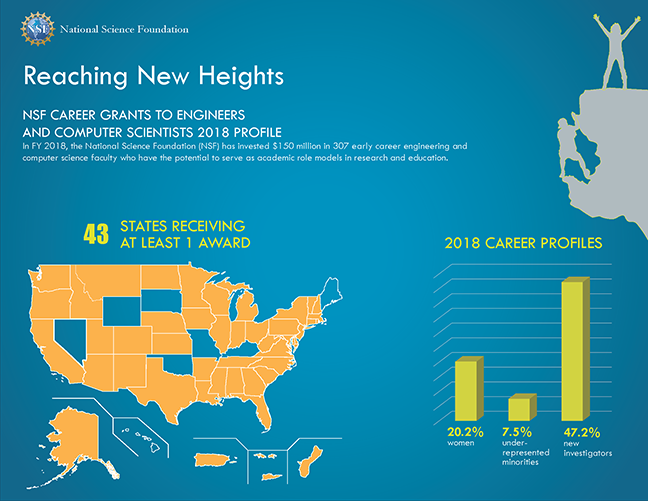Five CSE faculty receive National Science Foundation CAREER Awards

Grants intended to solve grand challenges and fund mentoring of future scientists and engineers
MINNEAPOLIS / ST. PAUL (07/06/2018) — Five University of Minnesota College of Science and Engineering early career researcher have received National Science Foundation (NSF) CAREER awards to further their research ranging from studying the sun to monitoring structures to speeding up wireless networks.
Over the next five years, researchers will receive up to $500,000 from NSF for each of their projects to build a firm scientific footing for solving challenges and scaling new heights for the nation, as well as serve as academic role models in research and education.
Nationwide, NSF has invested $150 million in 307 early career engineering and computer science faculty. This year's awardees in engineering and computer science hail from 120 institutions across 43 states.
Awardees from the University of Minnesota College of Science and Engineering include:
- Wei-Kuo Chen, assistant professor, School of Mathematics, “Mean Field Spin Glasses and Related Applications”—Statistical mechanical models, called spin glasses, are often cited as examples of complex systems used in understanding real-world problems in computer science and data science. This project aims to improve the current mathematical understanding of the mean field spin glass models and to establish theoretical foundations for applications in data science. An important part of the project is the development of educational activities including mentoring graduate students and postdoc fellows, developing advanced courses, and supervising undergraduate summer research.
- Lindsay Glesener, assistant professor, School of Physics and Astronomy, “Focused Hard X-ray Study of Energy Releases on the Sun and Stellar Objects”—This five-year CAREER project is intended to form an important link between the high-energy solar and astrophysics communities, and offers an opportunity to study flares on the Sun and other stars. In tandem, undergraduate and graduate students will construct and run a set of citizen science projects aimed at the investigation of particle acceleration in solar flares.
- Lauren Linderman, assistant professor, Department of Civil, Environmental, and Geo- Engineering, “Multi-Objective Optimization of Sensor Placement for Reliable Monitoring and Control of Structures”—This research aims to sustain the long-term performance of civil infrastructure by identifying the most effective measurement types and locations for monitoring and isolating structural response. The integration of sensor networks and physical systems is essential for maintaining this continued performance of civil structures while facing challenges in aging, energy, and the environment.
- Soheil Mohajer, assistant professor, Department of Electrical and Computer Engineering, “Coded Caching for Wireless Content Delivery Networks: Challenges and Opportunities”—The continuously increasing demand for broadband data has produced overwhelming network traffic and, despite steady improvements in wireless communication technology, data rates continue to fall short of the exponential growth in demand. This research will study techniques for caching data at local storage units closer to users during the off-peak hours of the network to reduce network traffic at peak hours.
- Cara Santelli, assistant professor, Department of Earth Sciences, “Genome-enabled investigations into the mechanisms and ecological controls on selenium transformations by fungi”—Using a genome-enabled approach, this research will examine and resolve the relevant fungal biogeochemical processes that influence the fate and distribution of selenium in nature. Results from the proposed research will directly inform new technologies for selenium bioremediation and will be of additional interest to government and local stakeholders. This project will also further engage, inform, and inspire students and the public on the important role that microorganisms play in maintaining and improving the overall health of planet Earth.
"NSF is committed to helping academic scientists and engineers launch careers of discovery and leadership," said Dawn Tilbury, head of NSF's Engineering (ENG) directorate. "With NSF CAREER awards, junior STEM faculty have the opportunity to tackle important and unique research challenges and to make our country's future healthier, safer and more prosperous."
NSF awarded more than 47 percent of these CAREER awards to first-time principal investigators. The awardees bring a diverse range of scientific and engineering thinking and expertise, essential for creating new knowledge and innovations to address complex problems.
"We're delighted to support this cadre of early career researchers as they embark on long-term research and education activities that will advance the frontiers of our field," said Erwin Gianchandani, acting assistant director for NSF's Computer and Information Science and Engineering (CISE) directorate. "These early career faculty will catalyze new breakthroughs in computer and information science and engineering that will transform our nation in the years to come."
NSF funding for these CAREER awards comes from NSF's Engineering (ENG) and Computer & Information Science & Engineering (CISE) directorates, with additional support from the NSF EPSCoR program.
To read more or see the full list of recipients nationwide, visit the NSF website.
